|
|
|
Sort Order |
|
|
|
Items / Page
|
|
|
|
|
|
|
| Srl | Item |
| 1 |
ID:
084511
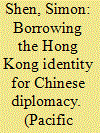

|
|
|
| 2 |
ID:
092994


|
|
|
|
|
| Publication |
2009.
|
| Summary/Abstract |
China's 21st-century re-entry into Africa has been made with considerable new fanfare and in a manner that contrasts sharply with the Maoist ideologist policy of the 1960s. However, how the Chinese perceive Africa, as expressed by the online community, has been little studied. In a country where full democracy and complete freedom of expression are still lacking, online communication arguably plays a particularly significant role. When it comes to topics in China which are not frequently addressed in the public domain, the flow of information among the online community is paramount in shaping public perceptions. The result of systematic qualitative research on the online community in China, this paper aims to bridge the gap between formal studies of Sino-African relations and online perceptions. Reconstructing the online image of Africa is essential in understanding not only contemporary Sino-African relations from the popular perspective but also the distorted nature of information that circulates in Chinese cyberspace.
|
|
|
|
|
|
|
|
|
|
|
|
|
|
|
|
| 3 |
ID:
099656
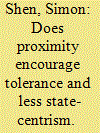

|
|
|
|
|
| Publication |
2010.
|
| Summary/Abstract |
After 9/11, the exact perception among young Chinese of terrorism and security is little known to the world. What are their views and how are they formed? Are there any obvious differences in perception between young Chinese in different parts of China? What causes this disparity, if there is any? Are these differences intentionally created by the Chinese party-state top-down, or are they only nurtured in a bottom-up, decentralized manner? Using primary research findings obtained from original quantitative surveys and qualitative analyses, this article attempts to offer an empirical answer to these questions. The article is arranged in three sections. The first provides a review of the literature on the topic and describes the research methodology used. The second offers an analysis of our survey findings on how university students from two different cities, Shanghai and Xi'an, evolve distinctive perceptions about terrorism and security. The third section explains the framework used to analyse our findings, which can be summarized as "the nearer, the more tolerant and the less state-centric" towards terrorist-related topics. A conclusion suggests the possible roles of-and wake-up calls for-the Chinese state and the media in light of these disparate perceptions.
|
|
|
|
|
|
|
|
|
|
|
|
|
|
|
|
| 4 |
ID:
107290
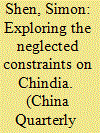

|
|
|
|
|
| Publication |
2011.
|
| Summary/Abstract |
In recent years, the governments of China and India have initiated a strategic partnership. Talks of creating an integrated "Chindia" economic hub have been commonplace. Many studies have been undertaken from conflicting perspectives on bilateral relations at the high level, but how ordinary Chinese people view their contemporary Indian counterparts and how this provides a civic dimension to the partnership remains under-explored. In an authoritarian nation where exhibiting sentiments contrary to the party-state's policy is not encouraged and remains uncommon, the Chinese have increasingly relied upon the internet to express their views on various aspects of policy, including that towards India. Using systematic, qualitative research on the online community, this article categorizes the various opinions expressed by Chinese internet users about India, the Indians and Beijing's Indian policy; analyses the apparent huge gap between these perceptions and the official rhetoric of Beijing; and forecasts how such perceptions might influence future Sino-Indian relations.
|
|
|
|
|
|
|
|
|
|
|
|
|
|
|
|
| 5 |
ID:
140486


|
|
|
|
|
| Summary/Abstract |
The Pacific Islands region might be regarded as one of the most remote and politically least significant areas in the geopolitical and economic considerations of world giants. However, as the regional order of the Asia–Pacific changes rapidly, China has shown more eagerness to engage the island states. Interestingly, Beijing's former arch-rival Taipei still maintains, arguably, considerable influence over the region. This raises a question that is thought-provoking: why is this status quo tolerated by Beijing? Drawing on empirical sources in relation to communication between Beijing, Taipei and these island states, by focusing on how Beijing handles the South Pacific region in general and the six non-recognizing states in particular, this article attempts to tackle the question by distinguishing the difference in Beijing's mentality today from that of 30 or 40 years ago. It argues that the zero-sum mentality of fighting against Taipei in the region has now been replaced by a positive-sum assumption to engage Taipei, as well as the pan-Chinese community in the world, via the PIS, regardless of whether they establish formal ties with Beijing or not.
|
|
|
|
|
|
|
|
|
|
|
|
|
|
|
|
| 6 |
ID:
112435


|
|
|
|
|
| Publication |
2012.
|
| Summary/Abstract |
As China's economic and foreign policies increasingly move away from the country's past socialist ideals, Beijing's attitude towards the DPRK has, in recent years, begun to subtly change. However, the close historic ties that exist between the two ruling communist parties prevent such changes from being overtly publicized in official discourses; criticizing the DPRK in China readily results in serious protests from Pyongyang. The popular perception in China of the DPRK, which is far more critical than the official version, is, on the other hand, hard to hide. In an authoritarian nation where exhibiting sentiments contrary to the party-state's policy is still not a safe and established practice, the Chinese people have increasingly relied on the platform of the Internet to express their views on various aspects of policy, including that towards the DPRK. This makes the Internet a rich resource for academics to gauge down-to-earth public opinion and how it contrasts with the official policy. Drawing on systematic, qualitative research on the online community, this article wishes to explore the possible differences between the written policy of Beijing and popular Chinese perceptions, or consensus if any, towards Pyongyang. The article is written in three parts. The first reviews the relevant literature on Beijing's contemporary policy towards the DPRK, the role of Internet opinions in Chinese foreign policy making, and introduces our methodology. The main part of the article typologizes and analyses the images as perceived by Chinese Internet users of the DPRK, its leaders and polices, as well as Beijing's DPRK policy, in order to highlight the differences between official policies and online opinions. Explanations for the discrepancies with the official line and the possible implications of our findings for China's future policy on the DPRK are discussed in the concluding section. As witnessed from the research, surprisingly, there was relative consensus of opinion among the different available viewpoints towards the DPRK regime, as both the Chinese nationalists and the liberals are likely to pressure Beijing to walk further away from Kim Jong-il in the future.
|
|
|
|
|
|
|
|
|
|
|
|
|
|
|
|
| 7 |
ID:
080456


|
|
|
|
|
| Publication |
2007.
|
| Summary/Abstract |
Focusing on the construction and reconstruction process of anti-American icons in contemporary China, this paper compares the patterns of interactions between the Chinese government, intellectuals and general public during four events centering on China-US relations: the 1999 Belgrade embassy bombing, the early 2001 plane collision incident, the September 11 attacks, and the 2003 war in Iraq. The article suggests that the proliferation of anti-American icons in China does not only point towards the existence of anti-foreign ideologies. It is also a channel for different players in China to advance their personal and group interests. As long as tolerance from Beijing is signalled, much nationalist rhetoric is a coded way of directing limited dissent at the Chinese state itself, but how exactly the Chinese public hold the "nationalist flags" - which is allowed by the party-state - against the "red flags" of the same regime remains relatively unexplored. Filling up such an intellectual vacuum is the central focus of this paper
|
|
|
|
|
|
|
|
|
|
|
|
|
|
|
|
| 8 |
ID:
109117
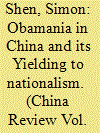

|
|
|
| 9 |
ID:
112506


|
|
|
|
|
| Publication |
2012.
|
| Summary/Abstract |
Using online Chinese communities as primary sources, this article studies public perceptions in China of Latin America in terms of how the region is seen as part of the Third World while also offering China a convenient backyard by which to access the First World United States. Codified online public opinion on four different Latin American topics is then analysed and compared with official opinion: how "Latin Americanization" becomes China's nightmare, how the Latin Americans should learn from the "China model," how the Latin Americans were being discriminated in the H1N1 epidemic, and how the "Latin American card" to balance the United States is emphasized. The conclusion suggests that only when the stereotypes discussed in this article are dismissed will the true value of Latin America gradually obtain any standing in the eyes of ordinary Chinese and will the Latin American mission of the Chinese government be fully understood by its subjects.
|
|
|
|
|
|
|
|
|
|
|
|
|
|
|
|
| 10 |
ID:
100974
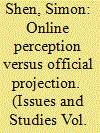

|
|
|
| 11 |
ID:
089520


|
|
|
|
|
| Publication |
2009.
|
| Summary/Abstract |
By conducting a set of quantitative surveys, this study evaluates the perception of Chinese students on terrorism. Three questions are tackled: (1) how they know about terrorism; (2) how they evaluate terrorist organizations and the U.S., and (3) how they view the corresponding Chinese foreign policy
|
|
|
|
|
|
|
|
|
|
|
|
|
|
|
|
| 12 |
ID:
095559


|
|
|
|
|
| Publication |
2010.
|
| Summary/Abstract |
Interest among academics towards Hong Kong's global status has gradually waned since 1997. However, identifying Hong Kong's position on the international platform is essential if the Special Administrative Region's competitiveness is to be distinguished from that of regional rivals. The positioning challenge not only results from the sovereignty retrocession, but also from the rapid pace of globalization and the intensified competition from major cities in the Greater China Region. Instead of focusing on the much-researched topic of the direct competition between Hong Kong and Shanghai or Singapore, an exploration of Hong Kong's hitherto little-researched re-branding experience not only throws light on Hong Kong Special Administrative Region's policy orientation, but is also valuable in understanding how other cities in the region conducted similar exercises. This article reviews the overall evolution of the 'Asia's World City' (AWC) discourse as promoted by the Hong Kong Special Administrative Region from 1997 to 2007. It starts by reviewing the international identity of post-colonial Hong Kong as background to the discourse, in order to reconstruct various theoretical assumptions that led to the re-branding exercise. The second section examines the purpose and evolution of the AWC campaign, and identifies the problems within the discourse. The concluding section focuses on the unrealized theoretical assumptions and other administrative and ideological constraints that the HKSARG faced in the exercise as a means to explaining the overall limited achievements of the campaign and proposes possible ways to remedy the shortcomings.
|
|
|
|
|
|
|
|
|
|
|
|
|
|
|
|
| 13 |
ID:
080571
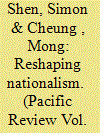

|
|
|
|
|
| Publication |
2007.
|
| Summary/Abstract |
Since the end of the Cold War, the international arena has witnessed two concurrent worldwide trends. One is the gradual prevalence of universalism under the banner of human civilization; the other is the gradual revival of nationalism globally under exactly the same heading. Both trends are evident in China, a country which in the twenty-first century is perceived universally as a rising nation. However, does Chinese nationalism necessarily pose a threat to the world? By examining two debates on the Chinese intellectual response towards Sino-American and Sino-Japanese relations in the early twenty-first century, this paper investigates the status of Chinese nationalism. It questions whether it is a fixed set of ideas embraced by a solid entity, or whether it possesses multiple layers with dual elements contributing to both security and insecurity internationally. The paper argues that three separate nationalist processes are occurring concurrently but independently of each other: the construction of civic nationalist values; the development of an international relations strategy assigning responsible power to China; and the detection of alleged anti-Chinese conspiracies. The effect of the first two would be to encourage regional peace, and they could offset fervent nationalist expression. A somewhat counter-intuitive result of Chinese nationalism might be that it also becomes a stabilizing force within and outside China's borders.
|
|
|
|
|
|
|
|
|
|
|
|
|
|
|
|
|
|
|
|
|